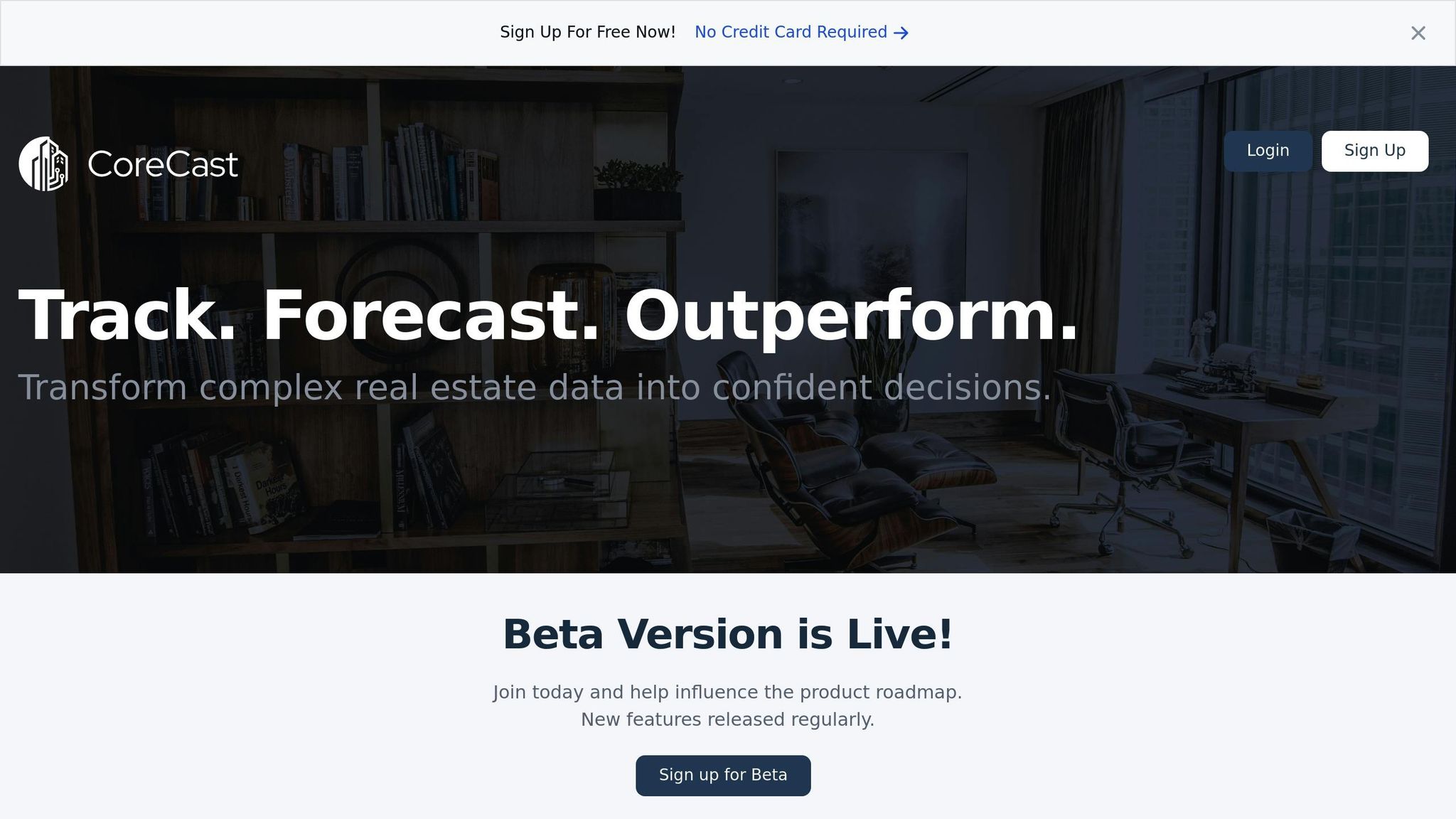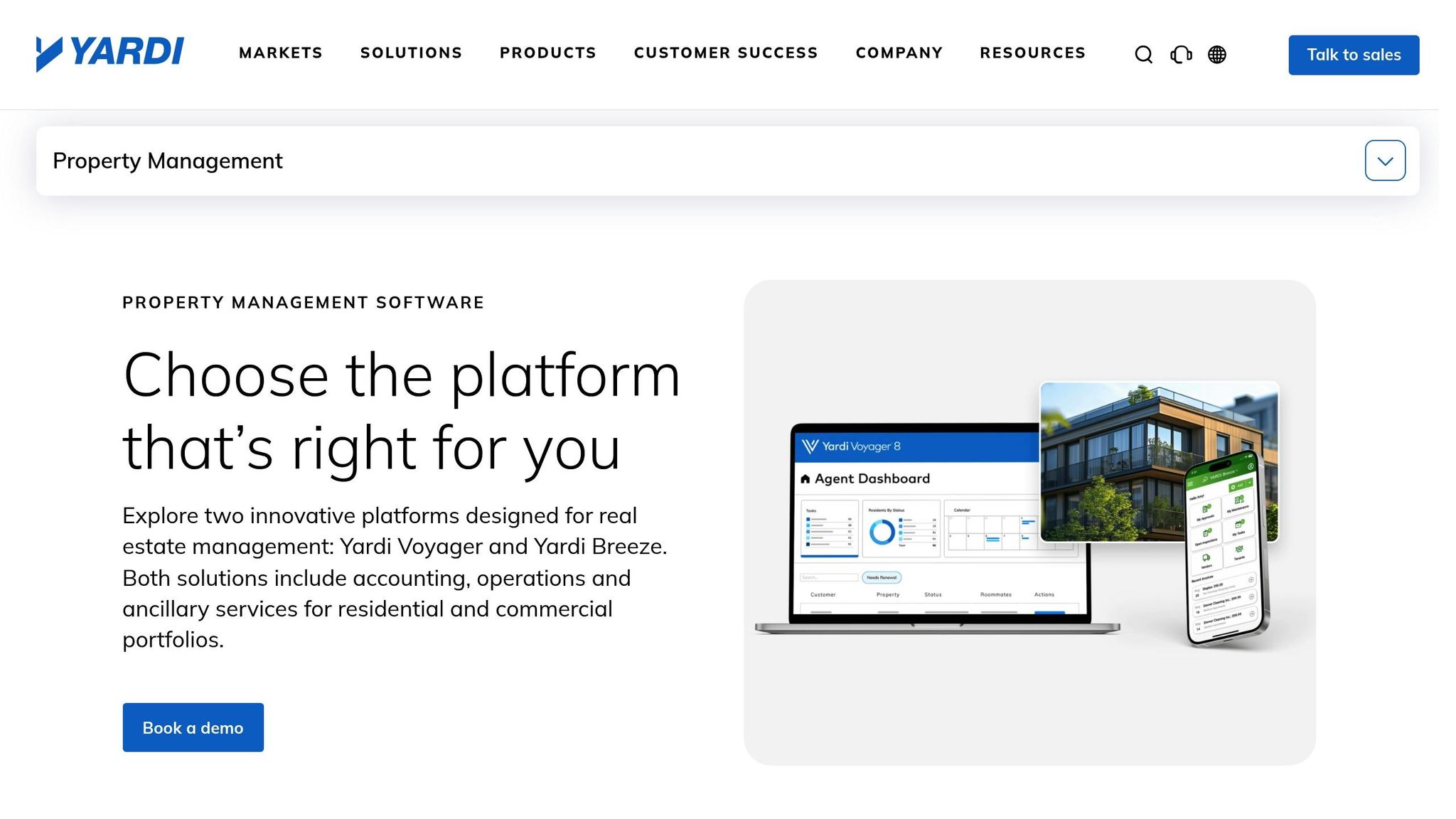COI Integration with Property Management Systems
Managing Certificates of Insurance (COIs) is a major challenge for property managers, with nearly 30% citing compliance as a top operational issue. Manual tracking is time-consuming, prone to errors, and increases liability risks. Integrating COI management tools with property management systems simplifies this process by automating updates, syncing data, and reducing compliance gaps.
Here’s a breakdown of three COI integration approaches:
- CoreCast: Focuses on combining COI data with portfolio analytics. Integrates with tools like Buildium and RealPage, offering real-time compliance tracking and planned AI features. Ideal for those prioritizing portfolio insights.
- Yardi: Embeds COI tracking into its property management ecosystem through partnerships. Offers automated compliance alerts and works well for large portfolios requiring detailed compliance checks.
- MRI: Uses API-driven integrations with COI platforms like myCOI to streamline compliance tracking. Best suited for mid- to large-sized portfolios needing automation and real-time updates.
Key takeaway: For small portfolios, built-in tools in Yardi or MRI may suffice. Larger operations benefit from specialized COI integrations, while CoreCast adds value through analytics and decision-making tools.
Quick Comparison:
| Platform | Integration Focus | Automation Features | Best For |
|---|---|---|---|
| CoreCast | Portfolio analytics + COI data | Planned AI-driven automation | Portfolio insights |
| Yardi | Property management + COI tools | Real-time compliance alerts | Large portfolios |
| MRI | API integrations for COI | AI document processing | Mid- to large-sized portfolios |
Choosing the right approach depends on portfolio size and compliance needs. A hybrid strategy combining property management systems and specialized COI tools often delivers the best results.
1. CoreCast

CoreCast is a comprehensive real estate intelligence platform designed to bring Certificate of Insurance (COI) data into a unified system for portfolio analytics and stakeholder reporting. While it works seamlessly with existing property management systems, its main focus is on consolidating COI data into a broader framework that supports better decision-making and compliance tracking.
Integration Depth
CoreCast is built for smooth integration with popular platforms like Buildium, QuickBooks, and RealPage. This allows property managers to stick with their current workflows while gaining access to a centralized dashboard that combines COI data with compliance status, portfolio analytics, and stakeholder reporting. Whether managing residential or commercial properties, users can take advantage of tailored insurance requirement templates designed for different asset classes. By consolidating these features, CoreCast not only simplifies COI management but also sets the stage for more automated processes in the future.
Automation Features
The platform takes the hassle out of COI management by automating key tasks like intake, tracking, and verification. With real-time updates, users receive compliance alerts and automated triggers that flag non-compliant vendors or tenants. It also streamlines renewal management by sending reminders for expiring COIs and providing automatic updates to stakeholders. Looking ahead, CoreCast plans to incorporate AI tools to predict compliance risks and handle routine tasks even more efficiently.
Compliance Management
CoreCast strengthens compliance oversight with real-time dashboards that provide instant insights into COI status across entire portfolios. Property managers can quickly spot compliance issues, review historical COI records, and generate branded compliance reports for stakeholders. The platform also simplifies audit preparation by centralizing document storage and sending automated alerts for expiring or non-compliant COIs, ensuring everything is ready when needed.
User Support
To make the transition to CoreCast as smooth as possible, the platform offers extensive user support. This includes onboarding assistance, detailed training modules, and ongoing technical help. Whether it’s setting up integrations, configuring workflows, or mastering analytics tools, users can access support through live chat, email, or a well-organized knowledge base.
2. Yardi

Yardi is a prominent property management software designed to support managers overseeing everything from single properties to extensive portfolios. While it offers basic compliance tracking, its standout COI management features come through partnerships with specialized platforms like bcs, SimpleCerts, and myCOI.
Integration Depth
Yardi’s integration capabilities create a seamless workflow by embedding COI information directly into its property and company management tools. Tenant data syncs automatically with integrated COI tracking platforms, ensuring compliance statuses are updated in real time. This automation reduces the need for manual data entry, cutting down on errors and duplications that can disrupt property management tasks.
The platform also supports tailored requirement templates for both residential and commercial properties. It automatically applies the appropriate insurance requirements based on lease type and tenant classification, removing the need for manual adjustments. This level of precision ensures every property type receives the correct compliance oversight.
By combining integration and automation, Yardi simplifies COI tracking and monitoring, making it an efficient tool for property managers.
Automation Features
When paired with specialized COI tracking platforms, Yardi extends its capabilities with AI-driven automation for processing and verifying certificates. These automated features go beyond Yardi’s standalone functionality, offering tools like triggers that flag non-compliant vendors directly within the system.
The platform also provides real-time monitoring, instantly alerting property managers when policies expire or coverage falls short. Automated renewal reminders and proactive notifications help prevent lapses in coverage, allowing teams to focus on revenue-generating tasks rather than manual compliance checks.
Compliance Management
Through its integration with COI tracking solutions, Yardi delivers thorough compliance tracking, minimizing liability risks by maintaining consistent and accurate data. Cross-system synchronization ensures data accuracy, reducing the likelihood of costly mistakes.
Real-time compliance updates keep property managers prepared with audit-ready documentation, no matter the size or complexity of their portfolios. This scalability is especially beneficial for companies managing diverse properties across multiple locations. Yardi’s robust compliance controls are further enhanced by its dedicated customer support.
User Support
Yardi offers strong support for users implementing COI tracking integrations. This includes access to customer service, training resources, and technical assistance to ensure a smooth setup and ongoing management experience.
Feedback from the industry highlights an easy integration process, with many property managers reporting significant time savings and improved compliance after adopting Yardi’s integrated COI tracking solutions. The platform’s ability to work with multiple COI tracking providers gives users the flexibility to choose solutions tailored to their specific needs.
3. MRI

MRI Software is a widely recognized property management platform catering to diverse property portfolios. While its core system includes basic compliance tracking, its real strength in managing Certificates of Insurance (COIs) lies in its partnerships with specialized platforms like myCOI and bcs.
Integration Depth
MRI leverages API-driven connections to keep COI data updated in real time. This eliminates duplicate entries and flags non-compliant vendors directly within MRI's dashboard, giving property managers immediate insights into compliance statuses without the need to toggle between systems.
During setup, data field mapping ensures that vendor and tenant information is accurately shared between MRI and the connected COI tracking solution. This real-time synchronization minimizes manual errors and keeps compliance data consistent across platforms[3][6]. Such seamless integration forms the basis for the advanced automation tools described below.
Automation Features
On its own, MRI's COI tracking is relatively simple. However, when paired with specialized COI tracking platforms, users gain access to powerful tools like AI-driven document processing and automated renewal reminders. These features streamline certificate intake, extract key data, and complete compliance checks in a fraction of the time it would take manually. This frees up property management teams to focus on revenue-generating tasks instead of time-consuming compliance monitoring[3][1].
Compliance Management
MRI's integrations with dedicated COI platforms enhance compliance oversight through standardized document reviews, instant alerts for expiring policies or insufficient coverage, and audit-ready reports. This proactive approach helps prevent liability gaps, offering property owners protection against financial risks, regardless of portfolio size or complexity[2].
A mid-sized property management company highlighted the impact of MRI's integrated approach by achieving a 70% reduction in manual data entry and significantly improving compliance accuracy using a myCOI integration. The setup enabled automatic insurance updates, compliance notifications, and centralized reporting, streamlining their operations[6][5].
User Support
MRI offers standard support via online resources and customer service, with additional training available through its COI tracking partners[3][5].
Setting up MRI's COI integration involves selecting a COI tracking platform, configuring API connections, and mapping data fields. Collaboration between property managers, MRI, and the chosen COI vendor is crucial to ensure a smooth implementation and address any technical challenges along the way[6][5].
With its extensive use in the real estate industry and strong property management capabilities, MRI serves as a reliable base for COI management. Organizations seeking advanced automation and detailed reporting will gain the most by integrating MRI with specialized COI tracking platforms[3][2][6].
sbb-itb-99d029f
Platform Comparison: Benefits and Drawbacks
Each platform brings its own strengths and weaknesses when it comes to integrating certificates of insurance (COI), tailored to different operational needs and portfolio complexities. Let’s dive into the key advantages and challenges of each.
CoreCast is designed to consolidate real estate data, offering tools for portfolio analysis and forecasting across various asset classes. It integrates COI data to provide broader insights at the portfolio level and has planned AI-driven automation features. It also connects with tools like Buildium and RealPage. However, CoreCast isn’t a property management or bookkeeping platform, so it relies on third-party COI tracking solutions to handle detailed compliance workflows.
Yardi, on the other hand, is a full-fledged property management platform known for its strong accounting and operational features. Its COI integration works through APIs with specialized compliance tools, enabling real-time data syncing and automated alerts for non-compliance. While Yardi is highly scalable and ideal for large portfolios, its built-in COI features are relatively basic compared to dedicated compliance platforms.
MRI Software offers similar benefits to Yardi, with established integrations to platforms like myCOI and bcs. It supports real-time synchronization, reducing duplicate data entries, and provides basic automation through its partner integrations. MRI is particularly suited for mid- to large-sized property management operations, offering a solid foundation for compliance tracking and operational efficiency.
| Platform | Integration Depth | Automation Features | Compliance Tools | User Support | Best For |
|---|---|---|---|---|---|
| CoreCast | Third-party integration with PM systems | Planned AI-driven automation | Portfolio-level analysis | SaaS support | Real estate intelligence and forecasting |
| Yardi | API integrations with specialized COI tools | Standard automation via APIs | Real-time compliance dashboards | Enterprise-level support | Large portfolios needing comprehensive PM features |
| MRI | Integrations with myCOI and bcs | Partner-enabled automation | Basic compliance tracking | Partner training and standard support | Mid- to large-sized portfolios with proven integrations |
These distinctions allow property managers to customize their compliance solutions based on their specific needs.
Specialized COI tracking platforms enhance automation and compliance efficiency, while property management systems like Yardi and MRI act as the operational backbone. CoreCast stands out by offering advanced portfolio analysis and market intelligence, which traditional property management systems typically lack.
For single-property managers, Yardi or MRI’s built-in compliance tools may be sufficient. But for larger portfolios, integrating specialized COI tracking platforms can significantly reduce compliance risks and improve staff productivity [3][4]. CoreCast’s unique value lies in its focus on investment analysis and strategic decision-making rather than just cutting operational costs.
Many property managers find a hybrid approach works best: using Yardi or MRI as the operational core, integrating specialized COI platforms for compliance automation, and leveraging CoreCast for advanced portfolio insights and forecasting. This combination addresses the diverse demands of modern property management effectively.
Conclusion
Bringing together the insights shared above, it's clear that COI integration strategies should align closely with a property manager's operational scale and strategic goals. There are three primary paths to consider, each tailored to different operational demands.
For those prioritizing automation and minimizing compliance risks, platforms like Yardi and MRI stand out. These systems excel at streamlining compliance through AI-enhanced processing, real-time tracking, and automated alerts. By reducing manual errors and liability risks, they help property managers stay ahead of compliance requirements[3].
On the other hand, CoreCast offers a broader scope by delivering robust real estate intelligence. Its advanced analytics, portfolio insights, and stakeholder management tools fill gaps left by traditional property management systems. While not a COI tracking or property management system itself, CoreCast integrates seamlessly with existing workflows, adding value through planned property management integrations.
For smaller portfolios or single-property managers, the built-in compliance tools within Yardi or MRI may suffice. However, larger portfolios often gain more from specialized COI integrations. These solutions not only close compliance gaps but also speed up vendor onboarding, improve audit results, and free up staff to focus on tenant relationships and property enhancements[3].
A hybrid approach often offers the best results - merging foundational operational tools with advanced compliance automation and portfolio analytics. This combination reflects the strengths outlined earlier, where each system contributes uniquely to achieving a balance of compliance, efficiency, and strategic insight.
When evaluating solutions, property managers should focus on platforms that provide real-time updates, automated notifications, and customizable templates for insurance requirements tailored to various property types. With ongoing advancements in AI-driven automation, the future holds the promise of faster compliance checks, better risk assessments across portfolios, and deeper integration between compliance, operational, and investment strategies.
Ultimately, success lies in choosing platforms that fit operational needs rather than opting for a one-size-fits-all solution. Whether the focus is on compliance automation, portfolio intelligence, or comprehensive property management, an integrated strategy can transform COI management into a valuable strategic advantage.
FAQs
How does integrating COI management software with property management systems help minimize compliance risks?
Integrating COI (Certificate of Insurance) management software with property management systems simplifies the entire process of monitoring and verifying insurance policies for tenants and vendors. It ensures that all necessary insurance documents remain current, minimizing the chances of non-compliance and reducing potential liability risks.
With features like automated policy expiration alerts and compliance checks, this integration takes over time-consuming tasks, allowing property managers to concentrate on more strategic responsibilities. By connecting these systems, property management teams can work more efficiently and stay confident in their risk management efforts.
How does CoreCast handle COI integration with property management systems?
CoreCast connects effortlessly with property management systems, making it easier for real estate professionals to handle Certificates of Insurance (COIs). While it’s not built for property management or bookkeeping, it enhances your workflow by bringing together real estate data, simplifying operations, and equipping you with tools to make smarter decisions.
Through integration with third-party platforms, CoreCast lets you monitor property data, evaluate portfolios, and manage pipelines - all without juggling multiple systems. This seamless approach not only simplifies COI management but also provides a complete view of your real estate assets, all in one streamlined platform.
How can CoreCast benefit property managers with smaller portfolios compared to built-in compliance tools in property management systems?
CoreCast provides property managers handling smaller portfolios with a powerful platform that goes far beyond the basics of compliance. Unlike traditional systems like Yardi or MRI, which often focus on specific operational tasks, CoreCast brings together real estate intelligence into one easy-to-use solution. This enables users to monitor their pipeline, evaluate portfolios across different asset classes, and access real-time insights about their properties and the competitive market - all from a single platform.
With CoreCast, property managers can do much more than just track data. They can produce custom-branded reports tailored for key stakeholders, conduct advanced underwriting, and even explore properties using an integrated map feature. While CoreCast can work alongside property management systems, its focus is on delivering broader capabilities. Think smarter investment strategies and better portfolio management, rather than day-to-day bookkeeping or operational chores.

